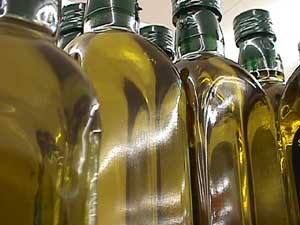-
- U.S. Episcopalians approve first openly gay bishop
- AIDS making a comeback in the U.S.
- Episcopal leaders deem same-sex union ceremonies acceptable
- Young lesbian’s stabbing death far from resolved
- NGLTF leader warns of backlash at annual Dignity meeting
- Group founded by gay bishop creates ‘safe space’ for teens
- Editor of GLBT paper appeals censorship ruling
- Probe continues into phone message accusing Arizona governor of gay agenda
- National News Briefs
- World News Briefs
dining out
Olive Oil: for all-around good health
Published Thursday, 14-Aug-2003 in issue 816
The role of olive oil has a short history for those of us who grew up eating salads drowned in bad “vinaigrettes” — the ones that our mothers would shake up in a Seven Seas bottle and use to drown iceberg lettuce.
Unless you grew up in a traditional Greek or Italian family, olive oil didn’t play widely into the American diet until the late ’70s and early ’80s, when Italy stepped up its export production and California olive pressers began multiplying to win a share of the market. Almost overnight, olive oil came into vogue.
But this highly digestible byproduct of the green olive has a rich and intriguing past that dates back to 5000 B.C., a time when Greek philosophers and physicians began touting its many curative properties. The olive tree itself became a symbol of abundance, glory and peace, while the oil from its fruit was used to anoint noble heads of state and the bones of the dead.
In ancient Egypt and Rome, it was infused with flowers and grasses to produce medicines and cosmetics. And by 1500 B.C. it became such a hot commodity that advance ships were built for the sole purpose of transporting it from Greece to trading posts around the Mediterranean.
The cultivation of olive trees during that time was paramount to the region’s wealth and power. In the land of the Hebrews, King David supposedly commissioned guards to watch over the numerous olive groves and warehouses that stored their precious oil. And in Hellenic societies throughout Greece, vandals of olive trees were condemned to death or exile.
Olive oil became a key component of the early Olympics as well. Not only did athletes rub it on their bodies for an aesthetic sheen — they were also awarded the stuff in five-ton quantities for winning various games. Whether they massaged it onto one another afterwards is another story.
Vandals of olive trees were condemned to death or exile. History aside, here are some facts you may not know about that “liquid gold” sitting in your cupboard:
• Extra-virgin olive oil has the lowest smoke point of all oils. Heat it above 375 degrees and you’ll end up with an odorous cloud in your kitchen.
• The deeper the color, the more intense the flavor.
• One ton of olives yields only 15 to 40 gallons of oil, depending on the variety. However, olive trees can produce fruit for hundreds of years when properly cultivated.
• You can extend the freshness of olive oil from six months (when stored at room temperature) to one year if you keep it in the refrigerator.
• Olive oil can be used for making desserts such as cakes, tarts or cookies that contain fruits and nuts.
• Olive oil reportedly helps the body assimilate vitamins A, D and K — and contains essential acids that we can’t produce naturally.
• Italy and Spain are currently the most prolific producers of olive oil. Greece and California rank second and third.
• According to the International Olive Oil Council, over 225 metric tons of the product was imported into the U.S. last year. Last year, Minute Maid sponsored an ad that featured Popeye and his arch-rival Bluto playing on a sea-saw, burying each other in the sand and getting matching tattoos that read. “Buddies for Life.” Later, riding on a bicycle-built-for-two, they pass their mutual friend, Olive Oyl, impervious to her waifish sexual charms. Although the gay overtones are obvious, Minute Maid spokesperson Dan Shafer denied that this was the intent of the ad, saying, “We’re not going to go there.”
|
|
Copyright © 2003-2025 Uptown Publications



